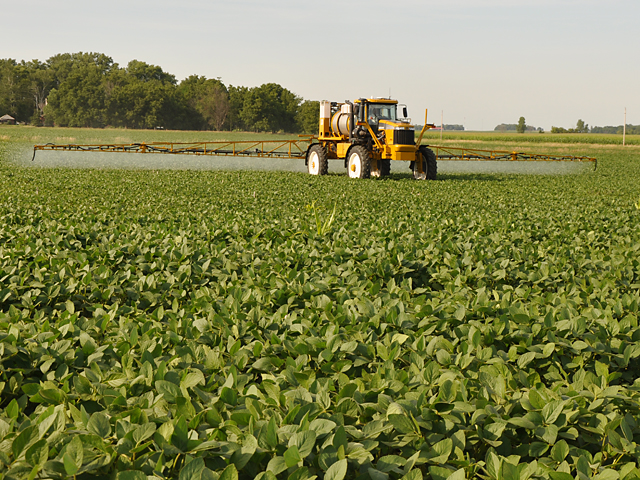State Dicamba Rule Updates
Dicamba Use Halted in Arkansas Due to Judicial Restraining Order
Editor's Note: This story, first posted on May 4, is being updated as litigation in Arkansas has changed the legal status of dicamba herbicides in that state. DTN will continue to post updates as the situation evolves.
**
ROCKVILLE, Md. (DTN) -- Three states have 2021 spray rules that restrict the use of dicamba herbicides beyond the federal labels of over-the-top herbicides XtendiMax, Engenia and Tavium.
ARKANSAS
It's a confusing year to be an Arkansas pesticide applicator.
On May 4, the state's plant board voted to approve new dicamba rules that permitted in-season use of the herbicide through June 30 for cotton and soybeans -- a big change from the state's 2020 rule, which halted all use after May 25. The new rule also banned spraying within 1 mile of university research centers, within half a mile of organic or specialty crops, within a quarter-mile of non-dicamba tolerant crops, and banned tank mixing dicamba with glyphosate as well as limiting use of older, more volatile formulations of dicamba.
Now, two lawsuits have upended that process, and a judge's temporary restraining order has flipped the state back to the 2020 rule with its May 25 cutoff, for now.
The first lawsuit, Glenn Hooks et al v. Arkansas State Plant Board, was brought by a group of farmers and environmentalists. The second, OMP Farms et al v. Arkansas State Plant Board, was brought by Ozark Mountain Poultry and a group called Freedom to Farm. Both lawsuits are challenging the newly passed dicamba rule.
On May 21, Judge Morgan Welch, of the 6th Division of the Pulaski County Circuit Court, issued a temporary restraining order to halt implementation of the new rule in response to the Hooks lawsuit.
P[L1] D[0x0] M[300x250] OOP[F] ADUNIT[] T[]
On May 24, that temporary restraining order was extended until June 10, when another hearing will be held. And today, May 26, both lawsuits were consolidated into one, given their similar arguments.
The Arkansas Department of Agriculture confirmed in a press release that the state's farmers and applicators must abide by the 2020 dicamba regulations for now:
"As a result of the temporary restraining order, the previous State Plant Board Rules on Pesticide Classification regarding dicamba remain in effect," the release said.
Those rules include
-- A ban on in-crop applications of dicamba after May 25.
-- A one-mile buffer around university research stations.
-- A one-mile buffer around organic or specialty crops.
-- A half-mile buffer around non-dicamba tolerant crop fields.
See the press release here: https://www.agriculture.arkansas.gov/….
INDIANA AND ILLINOIS
Two other states, Indiana and Illinois, will also have dicamba cutoffs in 2021 that are more restrictive than the federal label. Last year, EPA announced states could no longer use Section 24(c) labels to further restrict the federal label, so those state regulators worked through different legal paths.
On March 2, the Indiana Pesticide Review Board (IPRB) voted unanimously to categorize all dicamba herbicides containing more than 6.5% dicamba as highly volatile herbicides. This will allow the state to establish a statewide permit for their use, which will ban spraying them after June 20. See question and answers on these new rules from the Office of Indiana State Chemist here: https://www.oisc.purdue.edu/….
In Illinois, the state's Department of Agriculture established an emergency administrative rule in February that will ban applications of XtendiMax, Engenia and Tavium after June 20. The rule also prohibits spraying dicamba when the temperature rises above 85 degrees Fahrenheit. See more on those restrictions here: https://www2.illinois.gov/….
NO DICAMBA USE BEYOND THE FEDERAL LABEL
Several states, including North Carolina, Oklahoma and Texas, attempted to expand the federal dicamba labels in 2021. They submitted Section 24(c) labels with extended spray cutoffs to EPA to accommodate double-planted soybeans and late-planted cotton acres.
However, so far, EPA has rebuffed those moves, arguing that permitting more expanded use of dicamba would be unsafe and open the agency up to legal liability. See more from DTN here: https://www.dtnpf.com/….
Remember that the federal labels released in October 2020 do differ in key ways from the 2018 labels. See a DTN breakdown of that here: https://www.dtnpf.com/….
Emily Unglesbee can be reached at Emily.unglesbee@dtn.com
Follow her on Twitter @Emily_Unglesbee
(c) Copyright 2021 DTN, LLC. All rights reserved.






